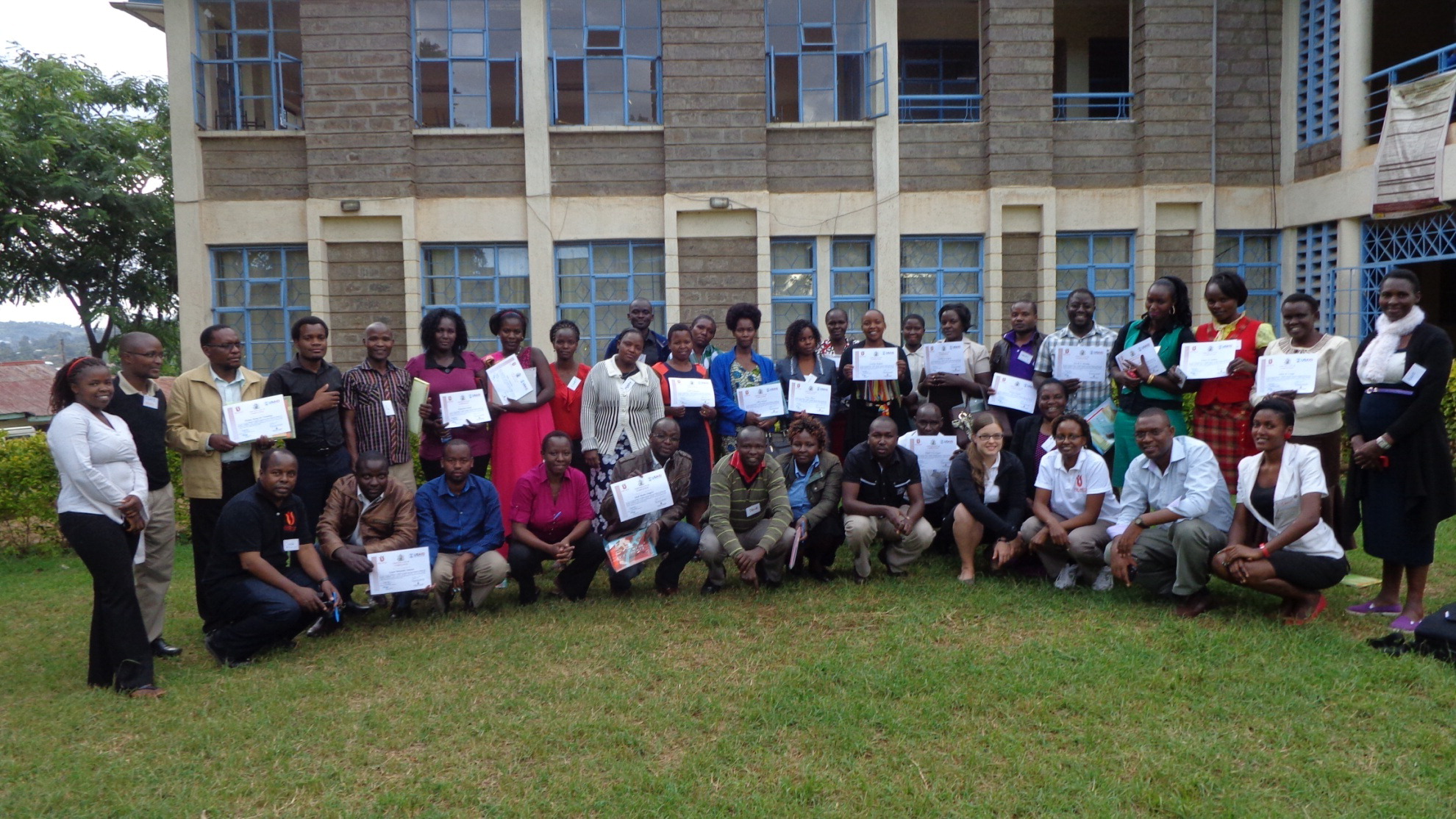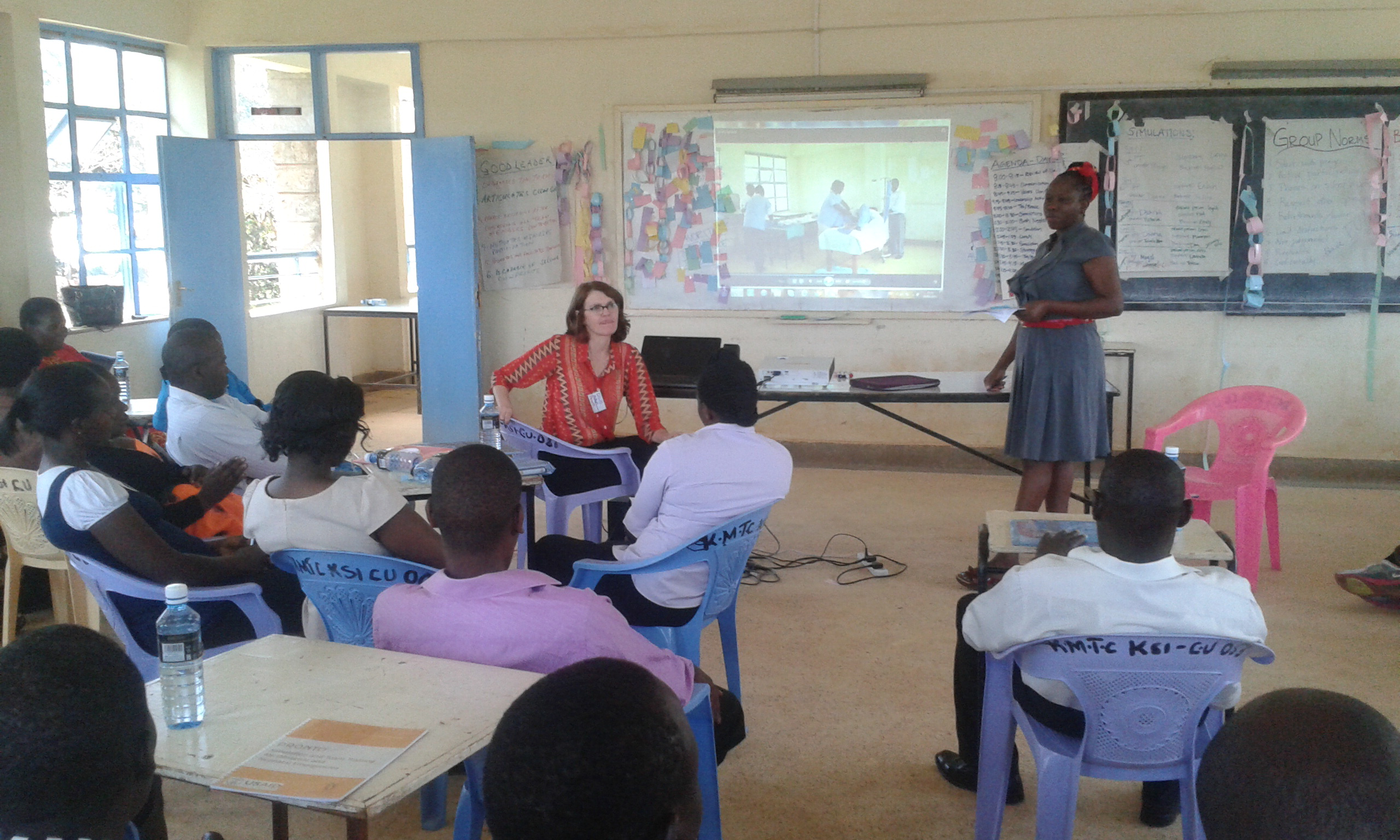 |
Facilitators and participants after completion of PRONTO Module 2 at Kisii Medical Training College, May 2015.(Photo courtesy of Dr. Gachuno)
|
In Kenya, neonatal mortality accounts for 60% of infant mortality. One-third of these deaths are due to intra-partum complications resulting in birth asphyxia, which can be prevented by effective interventions. The Government of Kenya has identified inadequate provider competencies in Emergency Obstetric and Neonatal Care (EmONC) as a major challenge to implementation of quality Maternal and Newborn Health (MNH) services and has prioritized improving skilled care and enhancing the capacity of health facilities to provide these services. In high-resource countries, simulation training has had the greatest success in changing practice and behavior in EmONC, particularly in emergency situations; however, the models used are expensive, complicated, and not conducive for limited-resource settings.
Developed by a team of U.S. and Mexican researchers and clinicians in 2012, PRONTO is a low-tech, highly realistic simulation and team-based training protocol specifically for limited-resource settings, which has been shown to improve health worker competencies in EmONC and decrease perinatal mortality. This training addresses skill and system barriers to the provision of sustainable quality EmONC thus reducing neonatal and maternal morbidity and mortality. The overall goal of this PEER project was to evaluate the effectiveness of PRONTO simulation and team training in emergency obstetric and neonatal care in a rural Kenyan setting. The PEER team studied the use of the training in Kisii health facilities, for workers caring for women during labor and delivery at these health facilities, and their newborns. Using a cluster randomized trial design, the researchers sought to determine the impact of PRONTO training on 24-hour neonatal mortality in health facilities, as well as on maternal and neonatal morbidity, health care worker knowledge, skills, and practice.
Final Summary of Project Activities
 |
| PRONTO Trainers, Dilys Walker and Salome Mose, debrief participants after a simulation during the PRONTO Module 1 training. (Photo Courtesy of Dr. Gachuno) |
Dr. Gachuno and his colleagues conducted trainings for eight intervention health facilities and Kisii Teaching and Referral Hospital, training a total of 92 health workers. They conducted pre- and post-training tests and evaluations on knowledge, skills, and attitudes. At the end of each training, each facility developed strategic development goals in obstetric and neonatal care for implementation in the health facility. The PEER researchers later held a training of trainers of 18 health providers and reproductive health coordinators from Kisii County on PRONTO simulation and facilitation techniques so that they could continue to conduct simulations with the PRONTO packs in the health facilities. The project included a total of eight quarterly supervisory visits during the course of study, during which the researchers monitored the roll out of a “near-miss” tool, reinforced the neonatal resuscitation skills, and held meetings with facility in-charges and their staff to emphasize the importance of filling the tools and conduct on-job training where there were gaps.
By the end of the study, the team found that their intervention group saw a significant decline in neonatal and perinatal mortality (2.4% control vs. 1.6% intervention, p =.009), showing the impact of the PRONTO protocol. With the help of the Kenyan Ministry of Health, the researchers developed a national training package to scale up implementation. At the time the project ended in late 2018, there was a high level of adopter commitment, although more funding is needed to implement these trainings as common practice nationwide.
The PI and team held several stakeholder meetings to present findings, including in-progress data collection and final findings to the County Health Management Team, In-Charges of the Health Facilities, and Local Ministry of Health Personnel. The researchers presented their findings across several national and international academic conferences, including the 10th Annual World Congress on Pediatrics, and they received a PEER Evidence to Action Supplement in July 2017 to disseminate their findings more broadly to stakeholders and policy makers at the national and country levels and develop an operational framework for the integration and implementation of PRONTO training.
PublicationsJulia C. Dettinger, Stephen Kamau, Kimberly Calkins, Susanna R. Cohen, John Cranmer, Minnie Kibore, Onesmus Gachuno, and Dilys Walker. 2018. Measuring movement towards improved emergency obstetric care in rural Kenya with implementation of the PRONTO simulation and team training program.
Maternal and Child Nutrition 14(Suppl 1): e12465.
https://doi.org/10.1111/mcn.12465 K. Bogaert, J. Dettinger, M. Kibore, O. Gachuno, J. Unger, and D. Walker. 2015. A baseline quality assessment of delivery care at a rural Kenyan hospital prior to PRONTO training.
Annals of Global Health 81(1): 139.
https://doi.org/10.1016/j.aogh.2015.02.820
John Cranmer, Julia Dettinger, Onesmus Gachuno, Minnie Kibore, Boniface Osano, and Dilys Walker. 2014. Tailoring a Successful Obstetrical Intervention: Learning from Global Partners and Customizing Curriculum to Kenya. Presented at the Annual Review Meeting of the University of Nairobi STD-AIDS Collaborative Group, Nairobi, Kenya, January 2014.





